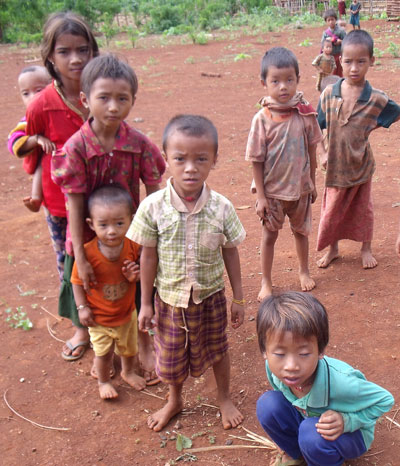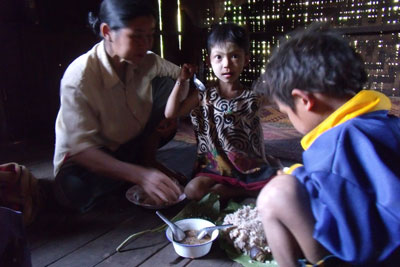Dawtamagyi village-tract, in Demawso Township, was dark and almost quiet. The families in all but one of the 19 houses had settled down for the night. Many of the 140 residents were sleeping...
Dawtamagyi village-tract, in Demawso Township, was dark and almost quiet. The families in all but one of the 19 houses had settled down for the night. Many of the 140 residents were sleeping.
 However, the light of the fire was visible from the home of Daw Kye Mae and the sound of a child crying was the only sound in the village.
However, the light of the fire was visible from the home of Daw Kye Mae and the sound of a child crying was the only sound in the village.
The child had been crying for hours. Then, suddenly he stopped.
Talking between family members and neighbors was heard.
I could not sleep, so I went to the house.
When I arrived, I saw Daw Kye Mae, the mother of 6 children, was embracing her 8 month old son, Maung Su Reh. Her husband, U Bo Reh, was sitting beside her. Other family members and neighbors were also sitting around the house.
“He has been sick since evening. He had a fever. He also suffered from diarrhea and vomiting,” Daw Kye Mae said.
Only the whites of his eyes could be seen. His face was gaunt. He was very thin.
The child was born with a cleft palate and according to his mother he often got sick.
Maung Su Reh was half conscious. His father was trying to cool his skin with a damp cloth.
A neighbor went outside to find medicine for the boy.
U Bo Reh asked me if I had any medicine. I had to tell him I didn’t.
We all worried about him. There was no medicine for him and no clinic or medical personnel in the area.
Maung Su Reh died around 7 a.m. the next morning.
Everyone was very upset. The family wept.
According to a Karenni Army medic, who sometimes travels to the area, children have died in the area because there is lack of hygiene and clean water and malnutrition. As well, there are no health services normally.
Government medical workers only come to the remote area every 3 to 6 months for inoculation projects for children, according to a local resident.
Daw Kye Mae and her family are rice farmers.
The oldest son and the second daughter help their parents in the rice paddy because their parents are poor. The remaining younger children go to the primary school near by their village.
When Daw Kye Mae gave birth to Maung Su Reh, she was over 45 years old. Her breasts could not produce milk because of her age. Maung Su Reh was fed rice broth.
 The family is very poor. So, Daw Kye Mae could not provide any other food for her son. That’s why Maung Su Reh suffered from malnutrition.
The family is very poor. So, Daw Kye Mae could not provide any other food for her son. That’s why Maung Su Reh suffered from malnutrition.
“Infants who are not breast-fed will suffer from malnutrition because of dietary deficiency. As well, children suffer from diarrhea if food is not prepared hygienically,” the medic said.
“Children who were born with a cleft palate can easily get respiratory diseases because it is connected with the throat. As well, parents who live in the rural area do not have family planning. They have many children and they are also poor. They are not able to care very well for their children- especially a child born with a cleft palate,” according to the medic.
The village is 30 miles away from Demawso Town, Karenni State, in mountainous terrain with no road. Villagers in need of emergency treatment have to travel by ox-cart to the hospital in Demawso.
Unfortunately, Maung Su Reh could not reach the hospital for treatment in time to save his life.
“About 10 children from each village-track in Pharuso and Demawso Townships died from diarrhea last year because they ate unhealthy food and had no clean water,” a Karenni social worker said.
“The authorities only think about military might. They don’t consider the needs of the people at all, including ethnic people,” she said.
“Currently, there are not adequate health services in the city. It’s an even worse situation in the rural areas. We (rural people) are not treated like human beings by our government. We have no rights.”
“My son should not have died,” Daw Kye Mae said. “If Maung Su Reh could have received medical treatment on time, he would still be alive.”



